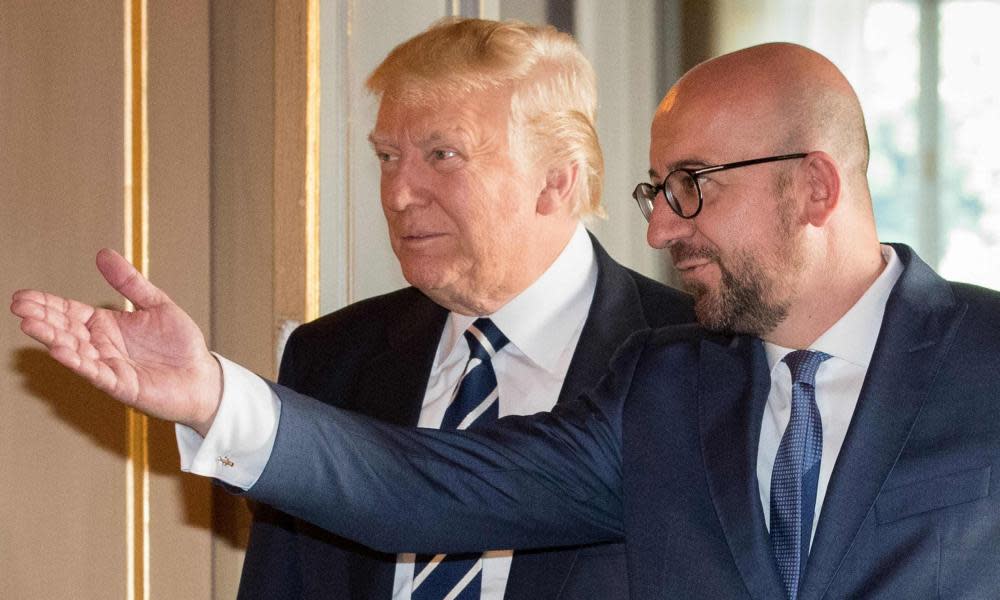Nato members anxiously hope Trump's visit will bring renewed commitment

Nervous European Nato members are hoping Donald Trump will finally end months of equivocation and policy incoherence by formally renewing America’s commitment to the alliance when he visits its headquarters in Brussels.
The mini-summit on Thursday will be a chance for world leaders to convey their personal condolences to Theresa May over the Manchester bombing – but also to restate Nato’s relevance to the fight against terrorism.
During the US presidential campaign, Trump repeatedly lambasted Nato as obsolete, excessively dependent on US funding and ill-equipped to fight terrorism, his chief foreign policy goal. At one stage, he even suggested that the US would not come to the aid of Nato allies if they came under attack – which would fly in the face of one of the alliance’s founding principles, enshrined in article five of the treaty.
Since his inauguration, however, Trump has inched back from his criticisms, and declared Nato “no longer obsolete”.
And at a working dinner to the new £1bn Nato headquarters in Brussels – a town he once called “a hellhole” – Trump is expected to make a formal commitment to the organisation’s goals.
Speaking before the summit, the US secretary of state, Rex Tillerson, vowed Trump would commit to the article five obligation to come to the defence of Nato partners.
A Nato official said the meeting would be focused on “stepping up Nato’s role in the fight against terrorism, and fairer burden sharing”. The official added: “This is part of Nato’s ongoing adaptation to the most serious security challenges in a generation, including terrorism and instability in our southern neighbourhood, and Russia’s aggressive actions in and around Europe. While we do not expect any new decisions on Russia, Nato allies will reconfirm our longstanding twin-track policy: strong defence combined with meaningful dialogue”.
Trump is expected to seek assurances that member states have realistic timetables to reach their stated goal of spending 2% of national GDP on defence by 2024. Tillerson said Trump’s core message would be to be “really tough” in seeking assurances that member states had realistic timetables in place to reach their stated goal of spending 2% of national GDP on defence by 2024.
Total spending across the alliance grew by nearly 4% in real terms (about $10bn) in 2016, but the US defence secretary, James Mattis, has sought milestones to mark the 2% target.
The Pentagon will especially be looking for clarity from Germany, Italy, Spain the Netherlands and Canada. Together, they represent close to 25% of Nato’s GDP. Yet their spending accounts for only about 10% of total alliance defence expenditure.
Germany argues it simply cannot double its spending to $60bn in four years, and that an enduring defeat of terrorism requires soft and hard power.
Trump’s Nato remarks are being scripted by a Nato sceptic, the White House aide Stephen Miller, but the expectation in Nato headquarters is that Trump will give a full-throated endorsement of article five.
Ahead of the working dinner at the headquarters, Trump, a New Yorker, will also unveil a memorial to the September 11, 2001 attacks, placed at the entrance to the new Nato building. The attacks on the twin towers were the only time Nato has invoked article five.
In a presidency marked by Trump’s ability to deviate from the pillars of his electoral campaign, Nato members have been left perturbed by the contradictory signals coming from the administration.
Vice-President Mike Pence failed to calm those fears when he addressed the Munich Security Conference in February, even as he insisted America remained utterly committed to the defence of Europe, including Ukraine.
In a recent interview with the Associated Press, Trump himself said his description of Nato as “obsolete” had been made at a time when he did not know much about the organisation. He also claimed that his criticism of Nato’s lack of focus on fighting terrorism had been made at a time when terror did not exist.
In practice, many member states believe the task of countering terrorism in Europe requires a mix of intelligence cooperation and national measures to prevent extremism.
In the wake of the Paris terror attacks of November 2015, for instance, France preferred to invoke the EU’s collective security clause rather than resort to Nato.
Trump is also likely to discuss both an increase in US troops of about 5,000 in a drive to push back the Taliban in Afghanistan after 15 years of fighting and a possible formal Nato role in the fight against Islamic State in Syria. At present, individual Nato members are in the anti-Isis coalition, but Nato, as an organisation, is not. It is possible Nato could take on a more formal role of military training in the Middle East.
In Syria, Trump has already twice taken unilateral military action, and already angered one Nato member state – Turkey – by saying he would arm Kurdish fighters to defeat Isis in Syria. Turkey regards the Kurdish YPD as an arm of the terrorist PKK, which is fighting for a Kurdish state inside Turkey. As yet, there is no overall clear Trump long-term political strategy for Syria.
The Brussels visit also represents Trump’s first meeting with European leaders on their home soil, and will include meetings with leaders of the European commission and a working lunch with Emmanuel Macron, the new French president.
Trump had predicted the Paris police attack in the middle of the French presidential campaign would have a “big effect” on the campaign, remarks seen as boosting Macron’s far-right rival Marine Le Pen.

 Yahoo News
Yahoo News 
